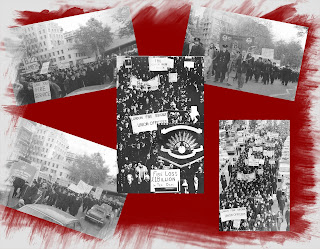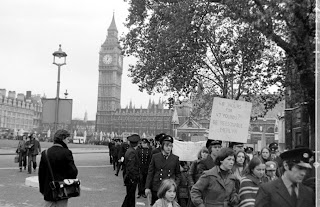Stories and events covering the history and times of London's fire service and some for the personalities that made it one of the premier fire brigades in the world.
Search This Blog
Monday, 13 November 2017
First National Firemen’s Strike. 14.11. 1977.
No pain, no gain…and it was painful for many of that era. A particularly unforgettable period for lots of reasons in the late 1970s. Now it’s very much part of fire service history now. But for those of us in the London Fire Brigade then the date reminds us, if it be needed, of the 9 week struggle of the first national Firemen’s strike. A struggle that helped forge a better future. So some London images, together with personal reflections, from that late autumn of 1977 and winter of 1978.
Four decades have passed since firemen across the UK walked out of their fire stations in that first national strike. It would not be the last. However, as long ago as 1961 fire service wages had suffered badly because of last minute interventions caused by various government pay policies. By 1971 a qualified fireman (someone with proven skills and four years’ service) was paid two pound fifty pence above the then average male earnings, but by 1977 it was almost thirteen pounds per week below the same comparative pay position.
The Callahan Labour government had insisted that from the 7 November 1977 any pay award to the fire service must be within their ten per cent guidelines. A position which was unacceptable to the FBU’s demand for a twenty pounds per week increase for qualified firemen. My own salary had only recently been increased by twenty quid from my Sub Officer rate at Southwark to a newly promoted Station Officer at West Norwood. I earned the princely sum of £303.00 per month for a 48 hour week, which included the £17.39p monthly under-manning allowance. Inflation was standing at almost 16% in 1977.
I, like many others, was uncomfortable about the prospect of going on strike. I had voted for it but passionately hoped that it would be settled and a fair pay deal would be struck. I did not want this strike to happen not least because we were putting our own families’ safety on the line too. It was inconceivable to me that a Labour government would allow the fire service to strike. The consequences seemed all too horrid to contemplate. Many of us grew increasingly anxious as each day the strike drew nearer. But with no positive news of a resolution to the situation things were not looking good.
Across London it was a White Watch night duty immediately before the strike started. At West Norwood it was a strange night shift to say the least. There was an unnatural hush that hung over the normally vocal faces which made up Norwood’s White Watch. The conversation was stilted, gung-ho feelings that some had expressed weeks before had completely disappeared. The clock was ticking, in truth time had already run out. The battle lines had been drawn and neither side had moved their position.
The strike started at 9 a.m. on that Monday morning of the 14th November. It was the normal time for a change of watch only that Monday there was no change of watch. As the station house bells rang out it signalled the end of the White Watch shift and the start of the first national firemen’s strike.
At stations around London the on-coming watches gathered on station forecourts together with off duty personnel in a show their solidarity. As we walked out of our station the fire engines remained, unmanned, in their appliance bays. Troops, the Army, Navy and later the RAF, had been thrown into a new front line. They had had only the most basic of firefighting training. I think I covered more when I did my Boy Scout’s firefighter’s badge! The military crewed the Green Goddess fire engines and operated out of army barracks or TA centres around the country.
In that November “Operation Burberry” swung into action on orders of the Government. It put stored Home Office fire engines on UK streets and, perhaps for the very first time, exposing the British public to these Green Goddesses on a nationwide scale. But some of us had ridden these slow and cumbersome machines from the days of the ‘AFS’ and when they were put on the run as a ‘front line’ appliance. I had ridden one for a couple of nights at Lambeth fire station because it was placed ‘on the run’ as a spare. It was a pig of a fire engine; uncomfortable and unreliable. It did not stay long at Lambeth either, an irate principal officer ordered the “green monstrosity” removed from his beloved Headquarters fire station. He demanded a proper red engine be put there and it was.
But now red engines across the Capital, in impeccable readiness, stood behind closed appliance room doors. Many were obstructed by parked cars and motor bikes of the firemen and officers standing on the station forecourt on that bleak late autumn day. At West Norwood we were soon standing around a warming fire blazing in a cut down oil drum, many of us thinking that we could not really be standing here on strike!
Day one rolled into day two of the firemen’s strike. Forty years ago the walls did not come tumbling down! It wasn’t all over in the first 24 hours. The London night sky wasn’t illuminated by countless fires burning out of control; nor was the air full of acrid smoke filling London’s streets. The pay claim had already turned into a poker game, at the very least we had expected talks. None came.
However, there was never any ill feeling towards the troops from striking firemen; in fact there was considerable sympathy and understanding for the unenviable task that had been foisted upon them by the Labour Government. I was the FBU’s Divisional Officers’ rep. I travelled around the ‘B’ Division stations speaking with the other union officers on the picket lines. In Bermondsey a Green Goddesses was spotted going to a ‘shout’, Peter Jansen (the Divisional FBU secretary) and I gave chase to see how our “understudies” were performing.
We followed the engine to a small car fire in Rotherhithe. Well it was small when it started. With such a small car fire firemen armed with a fire extinguisher, and quickly applied, would normally have dealt with it. But not here and not today. The car burnt out before our, and the troops’, eyes. First they could not get the fire engine’s pump to work as the small fire in the engine spread to the car’s interior. Next, as thick black smoke rose high into the air, the intense heat caused the car tyres to burst with an explosive BANG, something which sent the troops scurrying for safety behind their fire engine. When they did finally did get the pump engaged and got a jet of water to work the pressure was so great that the two squaddies could not control it and drenched the crowd of onlookers who had gathered to watch the performance. I did think, ruefully, that I would probably shoot myself in the foot if I had to assemble, load and fire a rifle given the same amount of training these young lads had, and they were all very young!
Christmas in 1977 should have been my first Christmas leave ever! But democracy ruled the picket line at West Norwood. There had been a crew on that picket line for every day of the strike. However, it had been decided that the fairest way to see who picketed over Christmas was to draw lots. Needless to say I drew the short straw, and along with four others, we spent Christmas Eve night on the 10pm - 6am shift in the makeshift hut. Neither were we alone as many of the local community continued to visit well into the early hours of Christmas morning dropping off bottles of drink and Christmas nibbles.
I, like so many others on strike, had been concerned that that Christmas would be a difficult and stressful family time. We had no money coming in since the day the strike had started. There was no strike pay from the FBU. What little savings we had was paying off our mortgage interest. Already my wider family, friends and neighbours had been exceptionally kind and generous ensuring that we did not go hungry. Now they gave us a Christmas to remember as they provided for our every need, including presents for the children and a completely decorated tree and a Christmas dinner. Such acts of kindness and generosity were repeated across thousands of firemen’s homes that Christmas as communities showed, in very real terms their support for us and the high regard which they held for their firemen.
With a final settlement agreed the strike was over in late January 1978. We at West Norwood’s returned to our normal duties. We had stayed solid on the picket line throughout the dispute whilst some other stations stood empty and with only the occasional token presence on their forecourt. At B31 we had none of the recriminations, and bitter feelings of resentment, experienced at other fire stations between FBU strikers and non-strikers. We had managed to stay unified throughout and now it was time just to get back to work, so we did.
For me the strike remains a badge of pride. Unified together and with a result that lasted for the rest of my career plus, of course, a fireman’s pension that I am forever grateful for.
Subscribe to:
Post Comments (Atom)
London's river fire service and its fire-floats. 1904-1937.
The London Fire Brigade was officially given that title on the 1st April 1904. Although to the vast majority of ordinary Londoner's it w...

-
On 18 November 1987, at approximately 19:30, a fire broke out at King's Cross St. Pancas tube station, a major interchange on ...
-
To some old firemen they are the stuff of myth and legend. Another piece of defunct fire brigade kit, along with the 50 foot escape l...
-
Foreward . BRIAN WILLIAM BUTLER , better known affectionately as ‘Bill’, was born in Brixton in the mid-1930s in the shadow of Brixton P...











Ye remember it like yesterday i was one of the servicemen our training consisted of 4 hours and told at end to make sure wind at your back or you'll all get wet didnt want to tell you any more incase it confused us properly breathing equipment no hi-ab pair of wellies string vest combat jacket and trousers and old tin helmet ppwe didnt even have a paired or blue lights to warn people for first two weeks just a bell with a rope attached i have total respect for you brave men your treatment at that time was disgraceful
ReplyDelete